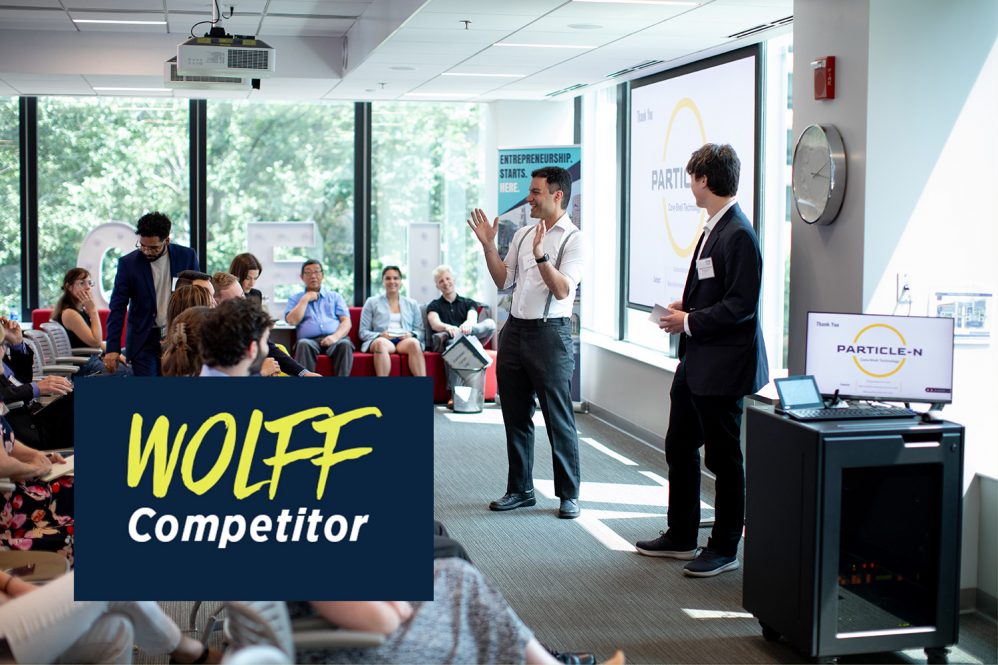Most startups aspire to achieve great things, but Particle-N, a UConn-affiliated technology company, has a particularly inspiring mission.
The company is preparing to enter the $19 billion, global precious-metal catalyst market and to simultaneously support the clean-energy industry in Connecticut.
“We have all purchased precious metals, such as gold and platinum for our loved ones, but that is not the only application for those metals,’’ says Al Kasani ’27 (ENG), the founder of Particle-N, and a serial entrepreneur. “A large proportion of all precious metals produced in the world are converted to catalyst material for industries such as oil and gas, hydrogen, or even automobile catalytic-converter production.’’
Particle-N is pioneering technology that will significantly reduce the amount of precious metals needed as catalysts and consequently slash costs for those industries. By using core-shell technology, Particle-N coats an inexpensive, environmentally friendly material with precious metals while achieving the same desired reactions. The technique can reduce the amount of precious metal used by up to 70 percent.
The cost of an automobile’s catalytic converter, now about $2,000, could be cut in half. The combination of fewer precious metals and a lower retail price would make it less desirable to thieves.
But perhaps the most impactful savings would be for green hydrogen generation, which now has a price tag between $400,000 and $870,000. Particle-N believes it could cut 30 percent from that expense.
“I enjoy solving problems,” says Kasani, a UConn Ph.D. candidate in chemical engineering. “I also have a great team with sharp minds. I have complete faith in my team. I tell people: ‘You’re going to hear about us!’”
Startup Vying for Top UConn Business Prize
On Tuesday, Particle-N and five other UConn-affiliated startups will compete for more than $50,000 in prize money during the Wolff New Venture Competition, the School of Business’ premier entrepreneurship event.
“We’re confident in our technology and our business model. It’s exciting to be pitching at the Wolff competition,’’ says Reiner Reichenberger ’24 (BUS), Particle-N co-founder and business manager. “We have attracted a great deal of interest, especially from the hydrogen industry. Particle-N already has potential customers that have expressed interest in placing orders worth around $5 million, as soon as we have the production capacity.’’
“It’s really important that we have this core-shell technology because the hydrogen industry is begging for solutions to bring down costs,’” Reichenberger says. “Connecticut is one of the largest hubs for the hydrogen industry, and we have the potential to help companies in Connecticut grow.’’
Connecticut companies that might benefit from the technology include Plug Power, Doosan, and Nel Hydrogen.
“When I started working on industrial projects from Connecticut-based hydrogen companies at UConn’s research labs, I realized the most significant barrier to these businesses is the high cost of precious metal catalysts,” says Kasani, who works in UConn President Radenka Maric’s lab at the Center for Clean Energy Engineering (C2E2).
“Hydrogen is the future energy carrier, and Connecticut is at the forefront of its development,’’ he says. “By lowering the cost of green hydrogen production, we will become a major player in the sustainability game as hydrogen replaces oil and gas as the primary energy carrier.’’
Particle-N team member Michael Dunn ’24 (ENG), an undergraduate chemical and biomedical engineering student, has experience working with catalysts in the hydrogen industry and last summer he interned at the U.S. Department of Energy. There, he developed a deeper appreciation of the challenges of producing clean energy. Particle-N’s technology offers a significant stepping-stone toward that transition, he says.
A Clear Path Forward
Particle-N is advanced in its business development. Its prototypes are complete, and the company is receiving patent protection. It has won several entrepreneurship competitions at UConn, and elsewhere, and received thousands in funding. With some legal roadblocks now resolved, the startup’s leadership is eager to move forward.
This summer, Kasani and Reichenberger participated in the Connecticut Center for Entrepreneurship & Innovation (CCEI)’s Summer Fellowship startup accelerator, where they benefitted from a myriad of business advice, including recommendations for further developing their business plan, attracting financing, and preparing for launch.
“In Rory McGloin’s classes, I learned how to tell my story in an easily digestible way. Also, Michelle Cote, an instructor for CCEI, helped us to polish our business model. And Alycia Chrosniak, Assistant Director of Brand & Venture Development at CCEI, always helped us with her insights,’’ Kasani says. “Before, my stories were too complicated. I learned to articulate complicated concepts in a way that would make sense for those who don’t work in this industry.’’
“I saw vast improvements to our work and the connections we made at CCEI were invaluable. They presented a very comprehensive program and gave us a clear path forward,’’ Reichenberger says.
Entrepreneur Has Already Found Fame
Particle-N isn’t Kasani’s first invention. Earlier this year he received publicity for the creation of a new, self-cooling camping tent. Using a proprietary fabric, and a single gallon of water, the cooling technology can last for up to 24 hours.
“Looking into nature is the key to many of our problems,’’ he said at the time. “Plants wick water from the ground and then sweat to cool themselves, and they get their required energy from the sun. What I did was simply to find a material that could do the same job.’’
The Wolff New Venture Competition will be held on Tuesday, Oct. 17 from 5:30 to 8:30 p.m. at the School of Business’ GBLC, Second Floor, 100 Constitution Plaza, Hartford. All are welcome. Please pre-register.



